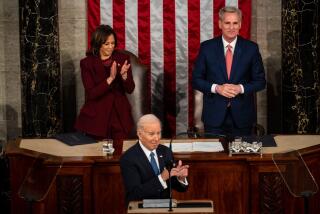Congressional Budget Office: Deficits mean tough choices ahead
- Share via
Reporting from Washington — Federal deficits are declining but are expected to continue at near record highs in 2012 as the “sluggish” economy continues to generate lower tax revenues and projected spending cuts lead to a bump in the unemployment rate, the Congressional Budget Office said Tuesday.
“How much and how quickly the deficit declines will depend in part on how well the economy does over the next few years,” CBO said in its annual Budget and Economic Outlook report.
“Probably more critical, though, will be the fiscal and policy choices made by lawmakers as they face the substantial changes to tax and spending policies that are slated to take effect within the next year under current law.”
The report shows the annual federal deficit is expected to hit $1.1 trillion in fiscal 2012, down from its record highs of recent years, but still more than anytime between World War II and 2008.
Lawmakers face distinct choices in the year ahead. Tax and spending decisions that are playing out in Congress and the presidential election could substantially alter the nation’s deficit trajectory.
For example, cutting spending as Congress is required to do under last year’s debt-ceiling agreement would cut deficits in half – to $585 billion in 2013 and less in 2014.
However, extending the George W. Bush-era tax cuts, which expire in December, would add $5.4 trillion to annual deficits over the next decade.
According to the report, if the current laws are kept in place, deficits are projected to fall to $3 trillion over the next decade -- a substantial reduction from earlier outlooks.
But under an alternative scenario that includes allowing the tax cuts to continue and avoids the automatic budget cuts from the debt deal, the 10-year deficit is expected to hit nearly $11 trillion.
The nation’s rising debt load dominated last year’s debate in Congress, especially as the new tea party Republicans pushed for spending cuts.
But lawmakers have grown weary of a cuts-only approach, as the automatic reductions scheduled to take effect in January 2013 would slice deeply into defense and domestic accounts. Many lawmakers are working this year on ways to prevent those cuts -- particularly to the Pentagon.
The nation’s debt load, under current laws, would hit $16 trillion in fiscal 2012.
CBO projects the nation’s gross domestic product will grow by 2% in 2012, but dip to 1.1% in fiscal 2013 -- and says the economy is only about halfway through the output shortfall from the recession and its aftermath.
The unemployment rate outlook is expected to continue to be above 8% -- spiking to 9.2% in 2013, largely because of the steep reductions required by Congress to federal spending.
More to Read
Get the L.A. Times Politics newsletter
Deeply reported insights into legislation, politics and policy from Sacramento, Washington and beyond. In your inbox three times per week.
You may occasionally receive promotional content from the Los Angeles Times.











